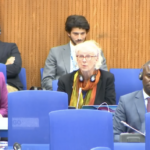
(c) International Narcotics Control Board Colombia: (TBA) Pakistan: Pakistan acknowledges and appreciates the effective role and efforts of the INCB in the collection of data, in-depth analysis, and compilation of the comprehensive report. We believe that the INCB report for 2023 will provide assistance to member states in aligning their national priorities and responses to …